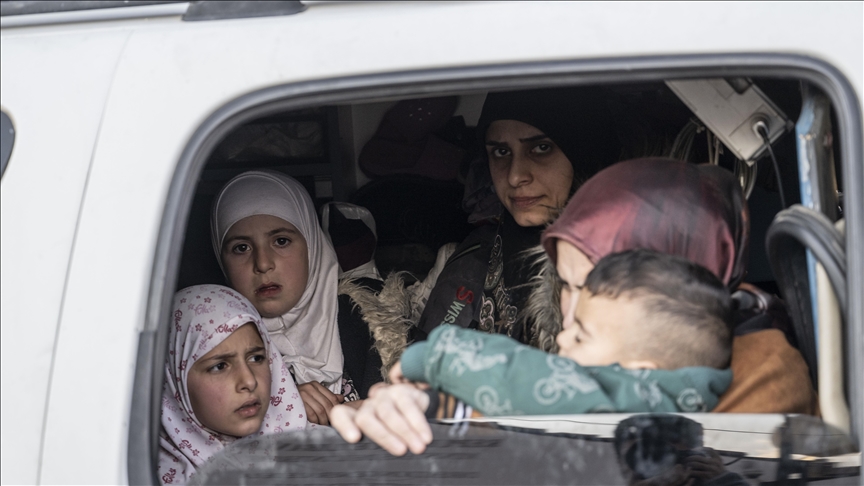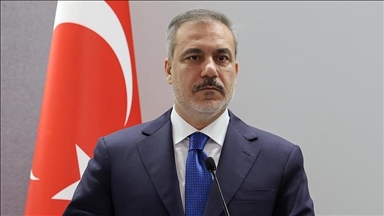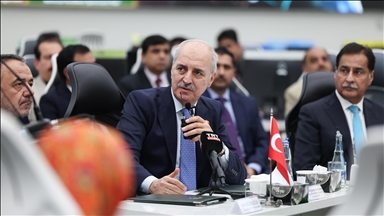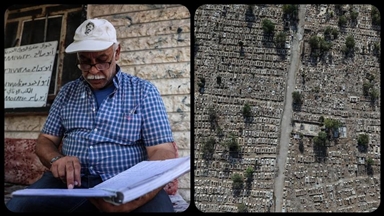As Syrians start returning home, UNHCR warns of key challenges ahead
Living conditions, devastated infrastructure including water, sanitation, housing, schools, and hospitals remain key after 14 years of war, says spokesperson for UN refugee agency
 Syrians in Lebanon gather on vehicles as they head towards the Al-Masnaa border crossing between Lebanon and Syria, after sixty-one years of Baath Party rule in Syria collapses on Sunday when, the capital Damascus fell out of the hands of regime control on December 8, 2024.
Syrians in Lebanon gather on vehicles as they head towards the Al-Masnaa border crossing between Lebanon and Syria, after sixty-one years of Baath Party rule in Syria collapses on Sunday when, the capital Damascus fell out of the hands of regime control on December 8, 2024.
- Living conditions, devastated infrastructure including water, sanitation, housing, schools, and hospitals remain key after 14 years of war, says spokesperson for UN refugee agency
- Recent events 'could be an opportunity for this huge displacement crisis to come to an end, provided that the conditions inside Syria are conducive to people returning in safety and dignity,' says William Spindler
- 'We don't want to see people returning only to be displaced again,' Spindler tells Anadolu
GENEVA
The world witnessed the largest displacement crisis in modern times unfold as the Syrian civil war brutally uprooted millions over the course of 14 years.
Now, with the Bashar al-Assad regime collapsed, many have begun to return home, waiting in long lines at the border or arriving via the country's few operational airports. While cautiously optimistic, the UN refugee agency (UNHCR) remains wary of challenges posed by security risks and devastated infrastructure.
William Spindler, a spokesperson for UNHCR, shared in an interview with Anadolu that despite the progress made, the situation remains volatile, with Syria still home to at least 7.7 million internally displaced people and over 6 million refugees in neighboring countries. Although more than 125,000 refugees have returned since the Assad regime's fall, many are still reluctant to return due to the ongoing violence, lack of essential services, and economic difficulties. —— ‘If we want them to be able to return, we need to make those economic conditions in Syria appropriate and conducive for those returns’
—— ‘We don't want to see people returning only to be displaced again’
William Spindler, a UNHCR spokesperson, noted that while many Syrian… pic.twitter.com/igpt1ezebH
"People are waiting to see how this (situation) will evolve," Spindler said. "There's been also a lot of progress in the sense that the situation is becoming more stable, but it's not yet completely stable everywhere."
Security remains a key concern, as well as the severe damage to the country's infrastructure like water and sanitation systems, housing, schools, and hospitals, all of which were severely impacted by the war.
"The recent events ... could be an opportunity for this huge displacement crisis to come to an end, provided that the conditions inside Syria are conducive to people returning in safety and dignity and also in a sustainable way, because we don't want to see people returning only to be displaced again," Spindler stated.
The spokesperson underscored that, for Syrians' return to be successful, conditions must ensure safety and sustainability. Many refugees are currently returning on a temporary basis to assess the situation, only to find destroyed homes, legal issues regarding property, and limited access to basic needs like food, education, and health care.
"That's why it's very important at this point to help in this transition towards a stable Syria," he said. "The international community needs to help to reactivate the economy, create the conditions for a sustainable return, so that when people return, they can stay and they can find livelihoods and shelter and basic services."
'No reason' for economic sanctions against Syria
Spindler also appealed for international efforts to revitalize Syria’s economy and restore essential services. He advocated for the removal of economic sanctions, which he believes are exacerbating the suffering of civilians and impeding reconstruction efforts.
"Sanctions were imposed by governments because of the nature of the former regime; that regime is no longer there. So there should be no reason for the sanctions," he said, reiterating the UN's call to lift sanctions that continue to complicate economic recovery.
"If we all want, particularly the Syrians themselves, them to be able to return, we need to make those economic conditions in Syria appropriate and conducive for those returns," the spokesperson said. "So it's important that the economy is reactivated, (and) services are provided."
Despite growing hope for an end to the displacement crisis, Spindler reiterated the UNHCR's position against forced returns, emphasizing that repatriation should remain voluntary.
"The position of UNHCR is that, because the conditions are not ready, there should be no force to return to Syria," Spindler said. "Syrians should be given the time, the space to make an informed choice of when to return, and they should not be pressurized."
“No Syrian should be forcibly returned while conditions remain unstable,” he said, adding that the agency is working with host countries to ensure that returns are voluntary and conducted in a manner that respects human dignity.
"We urge caution and patience," he called on host countries.
The UNHCR believes that "most of the refugees" will eventually choose to return, based on historical trends, he added.
$310M needed for first 6 months of 2025
As the international community faces increasing pressure to address Syria’s ongoing crisis, Spindler emphasized the importance of a coordinated global response to address both immediate needs and the long-term resolution of displacement.
The UNHCR is seeking $310 million for the first half of 2025 to support efforts aimed at providing for displaced Syrians and those returning to the country.
This appeal includes assistance for 200,000 community members who will be hosting refugee returnees, as well as internally displaced persons (IDPs).
The agency anticipates up to 1 million refugee returns between January and June 2025, alongside over 2 million IDP returns and more than 1 million IDP returnees during the same period.
The UNHCR also highlighted that over 16 million people, or 90% of the Syrian population, are currently living below the poverty line and rely on humanitarian aid for survival.
Anadolu Agency website contains only a portion of the news stories offered to subscribers in the AA News Broadcasting System (HAS), and in summarized form. Please contact us for subscription options.







